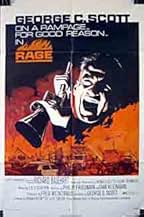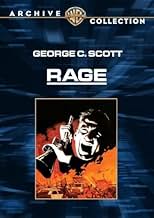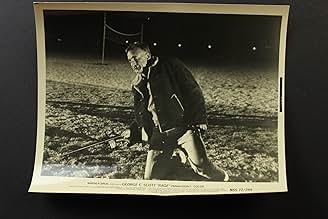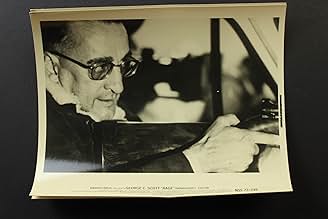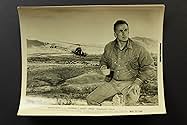IMDb RATING
6.3/10
1.5K
YOUR RATING
An accidental nerve gas leak by the military kills not only a rancher's livestock, but also his son. When he tries to hold the military accountable for their actions, he runs up against a wa... Read allAn accidental nerve gas leak by the military kills not only a rancher's livestock, but also his son. When he tries to hold the military accountable for their actions, he runs up against a wall of silence.An accidental nerve gas leak by the military kills not only a rancher's livestock, but also his son. When he tries to hold the military accountable for their actions, he runs up against a wall of silence.
- Director
- Writers
- Stars
- Director
- Writers
- All cast & crew
- Production, box office & more at IMDbPro
Featured reviews
As you might be able to tell from the plot synopsis, Rage is a pretty upsetting movie to watch. Since you probably know my taste in films (if you've been reading the Rag for a while), you might wonder why I watched it in the first place. Made in 1972, it has remarkable relevancy in today's world, so I thought it might have an emotional impact. It certainly did! In fact, given a re-release, I'm sure it would be very popular at the box office.
In case you haven't read the synopsis, George C. Scott stars as a father who's teaching his young son the ropes about farming. They spend one night outdoors on their property, and in the morning, George finds his son bleeding and deathly ill. He rushes him to the hospital, but Dr. Martin Sheen soothes that there's nothing seriously wrong with the boy. Then why does Martin want to keep them both quarantined and take further tests? It turns out, there was a government experiment that went wrong, and a terrible chemical spill infected the air. With massive cover-ups in play, will George ever find out the truth?
This was a bit of a pet project for George, as he also directed the film. Perhaps he felt drawn to the 1970s "question authority" mantra, or perhaps he just liked the opportunity to fly off in a rage and get revenge on "the man". It is absolutely George's show, as he has to go through all the stages of worry, belief, grief, distrust, and vengeance. Although, I particularly liked Richard Basehart's performance in this film. He plays George's regular family doctor, and he comes across as extremely trustworthy. So, when he sits George down and lies to him about what's happening to his son, it's very eerie. If Mr. Honesty can be drawn into the cover-up, no one is safe!
Kiddy Warning: Obviously, you have control over your own children. However, due to gruesome images and upsetting scenes involving a child, I wouldn't let my kids watch it.
In case you haven't read the synopsis, George C. Scott stars as a father who's teaching his young son the ropes about farming. They spend one night outdoors on their property, and in the morning, George finds his son bleeding and deathly ill. He rushes him to the hospital, but Dr. Martin Sheen soothes that there's nothing seriously wrong with the boy. Then why does Martin want to keep them both quarantined and take further tests? It turns out, there was a government experiment that went wrong, and a terrible chemical spill infected the air. With massive cover-ups in play, will George ever find out the truth?
This was a bit of a pet project for George, as he also directed the film. Perhaps he felt drawn to the 1970s "question authority" mantra, or perhaps he just liked the opportunity to fly off in a rage and get revenge on "the man". It is absolutely George's show, as he has to go through all the stages of worry, belief, grief, distrust, and vengeance. Although, I particularly liked Richard Basehart's performance in this film. He plays George's regular family doctor, and he comes across as extremely trustworthy. So, when he sits George down and lies to him about what's happening to his son, it's very eerie. If Mr. Honesty can be drawn into the cover-up, no one is safe!
Kiddy Warning: Obviously, you have control over your own children. However, due to gruesome images and upsetting scenes involving a child, I wouldn't let my kids watch it.
While camping out, a Wyoming sheep rancher and his son are accidentally sprayed with a secret poison. The boy dies while the military covers up its mistake, enlisting civilian personnel in the cover-up. But will the father find out, and if so, what will he do.
It's important to keep in mind that the screenplay is based on a true 1968 occurrence. The Pentagon covered up poisonous contamination of several thousand sheep in Utah, and only admitted it after overwhelming evidence. I assume they were wary of being seen experimenting with poisonous chemical at a time when the Vietnam War was going badly. The movie itself is very methodical. The first part dealing with the cover-up shows how deception is spread among medical and military professionals. Surprisingly, however, no higher justifications such as national security are cited. It's more like an embarrassment than a security breach.
Anyway, Scott really low-keys it throughout, being good-citizen cooperative even as he's fed one lie after another about his son. Even after he finds out the truth, his rage is more intense than histrionic. I guess I was expecting him to explode in the scary way that only he can. Apparently, the actor wasn't happy with his performance (TCM), blaming it on his divided roles as both director and lead performer.
All in all, the movie's like a slow fuse being lit until it finally goes off. Just how sane Logan (Scott) is during those climactic moments is, of course, anybody's guess. Considering what's happened to him, his actions are understandable, if not excusable (innocents die). At the same time, the lessons are, if anything, more relevant now than then, especially with the rise of our national security state and its mass surveillance program.
(In passing—this is one of the few films I've seen to actually portray death throes as the person expires. Kudoes to Scott for including such a disturbing detail that traditional Hollywood avoided like the plague. More of that and audiences might take a different view of movie violence.)
It's important to keep in mind that the screenplay is based on a true 1968 occurrence. The Pentagon covered up poisonous contamination of several thousand sheep in Utah, and only admitted it after overwhelming evidence. I assume they were wary of being seen experimenting with poisonous chemical at a time when the Vietnam War was going badly. The movie itself is very methodical. The first part dealing with the cover-up shows how deception is spread among medical and military professionals. Surprisingly, however, no higher justifications such as national security are cited. It's more like an embarrassment than a security breach.
Anyway, Scott really low-keys it throughout, being good-citizen cooperative even as he's fed one lie after another about his son. Even after he finds out the truth, his rage is more intense than histrionic. I guess I was expecting him to explode in the scary way that only he can. Apparently, the actor wasn't happy with his performance (TCM), blaming it on his divided roles as both director and lead performer.
All in all, the movie's like a slow fuse being lit until it finally goes off. Just how sane Logan (Scott) is during those climactic moments is, of course, anybody's guess. Considering what's happened to him, his actions are understandable, if not excusable (innocents die). At the same time, the lessons are, if anything, more relevant now than then, especially with the rise of our national security state and its mass surveillance program.
(In passing—this is one of the few films I've seen to actually portray death throes as the person expires. Kudoes to Scott for including such a disturbing detail that traditional Hollywood avoided like the plague. More of that and audiences might take a different view of movie violence.)
Almost everything in this film is predictable. The failure of the military to take responsibility, the complicity of local physicians and authorities, and a complete cover-up by the military brass; all of it rather predictable.
Despite these types of nerve gas weapons being outlawed by the Geneva Convention, they still, of course, still exist, within various nefarious military installations dedicated to this type of warfare. The military does not particularly care what the Geneva Convention has to say about these weapons; all is fair under the guise of National Defense.
What transpired in the film, of course, was a tragedy, but the result was inevitable. Scott does a good job acting, and an adequate job of directing. However, the screenplay is so absolutely depressing from beginning to end, that even a raging George C Scott cannot save it. It is this predictability that ruins any chance of the film having elements like suspense or tension. Interesting to watch for Scott's performance.
Despite these types of nerve gas weapons being outlawed by the Geneva Convention, they still, of course, still exist, within various nefarious military installations dedicated to this type of warfare. The military does not particularly care what the Geneva Convention has to say about these weapons; all is fair under the guise of National Defense.
What transpired in the film, of course, was a tragedy, but the result was inevitable. Scott does a good job acting, and an adequate job of directing. However, the screenplay is so absolutely depressing from beginning to end, that even a raging George C Scott cannot save it. It is this predictability that ruins any chance of the film having elements like suspense or tension. Interesting to watch for Scott's performance.
Outstanding action. Ruthless vengeance on an uncaring military bureaucracy bent on covering the truth to protect themselves. This came out during the discovery of the Watergate cover-up.It was a timely tale of righteousness. Well acted,taut paced. One of the few times made for tv is not an excuse.
***THIS COMMENT MAY CONTAIN SPOILERS*** Maybe its me but there was something about this film that worked on my nerves like a tongue on a rotten tooth. It's based on a true incident in Utah in which an Army truck dropped a cannister filled with nerve gas and a butt-load of sheep bought the proverbial farm. But if the wind had happened to be blowing in the direction of Salt Lake City that day...
George C. Scott (wearing what looks distractingly like fake eyebrows) directed and stars in this fictionalized account of a farmer and his young son who are accidentally poisoned with nerve gas by the Army.
Perhaps its my own experiences at the hands of prison doctors that makes the many scenes of bloodless technocrats abstractly speaking about the opportunity to study nerve gas symptoms and blithely LYING with their every breath so quietly, eerily effective.
After being lied to in the worst possible way by all responsible, George C. Scott's doomed farmer wreaks some almost Rambo-like revenge! I had heard about this movie for years and always wondered just what sort of havoc Mr Scott would wreak went he went into his RAGE... It was quite something to see him shooting security guards in the face and generally going postal. One can certainly understand where he is coming from. A film like this would never be made today, especially with a major movie star both directing and starring. George C Scott knows how to handle actors--this is probably one of Richard Baseheart's best performances--full of great conflicted emotions and heavy themes to wrestle with--and what a voice that man had! I think that one of the strengths of the story is the semi-documentary feel to the events. There is no giant conspiracy, just an average army-style Cover-Your-Ass situation, with those responsible already well insulated by their positions of power. The revenge enacted by Scott's character is as understandable as it is ultimately ineffective, a message nicely telegraphed by the final image, which I won't divulge here. Suffice it to say, this is one of those strange cinematic oddities from the 70's that has become, unfortunately, once again relevant. After all... if the wind had happened to be blowing towards Salt Lake City that day...
George C. Scott (wearing what looks distractingly like fake eyebrows) directed and stars in this fictionalized account of a farmer and his young son who are accidentally poisoned with nerve gas by the Army.
Perhaps its my own experiences at the hands of prison doctors that makes the many scenes of bloodless technocrats abstractly speaking about the opportunity to study nerve gas symptoms and blithely LYING with their every breath so quietly, eerily effective.
After being lied to in the worst possible way by all responsible, George C. Scott's doomed farmer wreaks some almost Rambo-like revenge! I had heard about this movie for years and always wondered just what sort of havoc Mr Scott would wreak went he went into his RAGE... It was quite something to see him shooting security guards in the face and generally going postal. One can certainly understand where he is coming from. A film like this would never be made today, especially with a major movie star both directing and starring. George C Scott knows how to handle actors--this is probably one of Richard Baseheart's best performances--full of great conflicted emotions and heavy themes to wrestle with--and what a voice that man had! I think that one of the strengths of the story is the semi-documentary feel to the events. There is no giant conspiracy, just an average army-style Cover-Your-Ass situation, with those responsible already well insulated by their positions of power. The revenge enacted by Scott's character is as understandable as it is ultimately ineffective, a message nicely telegraphed by the final image, which I won't divulge here. Suffice it to say, this is one of those strange cinematic oddities from the 70's that has become, unfortunately, once again relevant. After all... if the wind had happened to be blowing towards Salt Lake City that day...
Did you know
- TriviaThe story was inspired by and incident at the Dugway Proving Grounds in Utah on 13 March 1968. The U.S. Army conducted tests of a nerve agent chemical weapon, later revealed to be VX nerve gas, including spraying it from a jet aircraft. Between 3,000 and 6,000 sheep were reportedly killed. The Army did not admit fault for the incident until 1998.
- GoofsAlthough most of the officers are wearing the Vietnam Campaign and Vietnam Service ribbons, none of them wears a patch on their right shoulder depicting the unit they served with in Vietnam. The wearing of such "combat patches" is customary in the U.S. Army.
- How long is Rage?Powered by Alexa
Details
- Release date
- Country of origin
- Language
- Also known as
- Rage
- Filming locations
- Benson, Arizona, USA(Hospital scenes, Marie's truck stop sign)
- Production companies
- See more company credits at IMDbPro
Contribute to this page
Suggest an edit or add missing content




